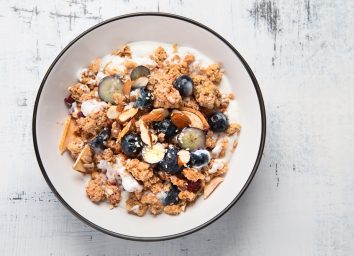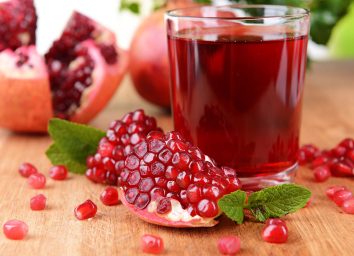13 Breakfast Foods To Eat for a Longer Life
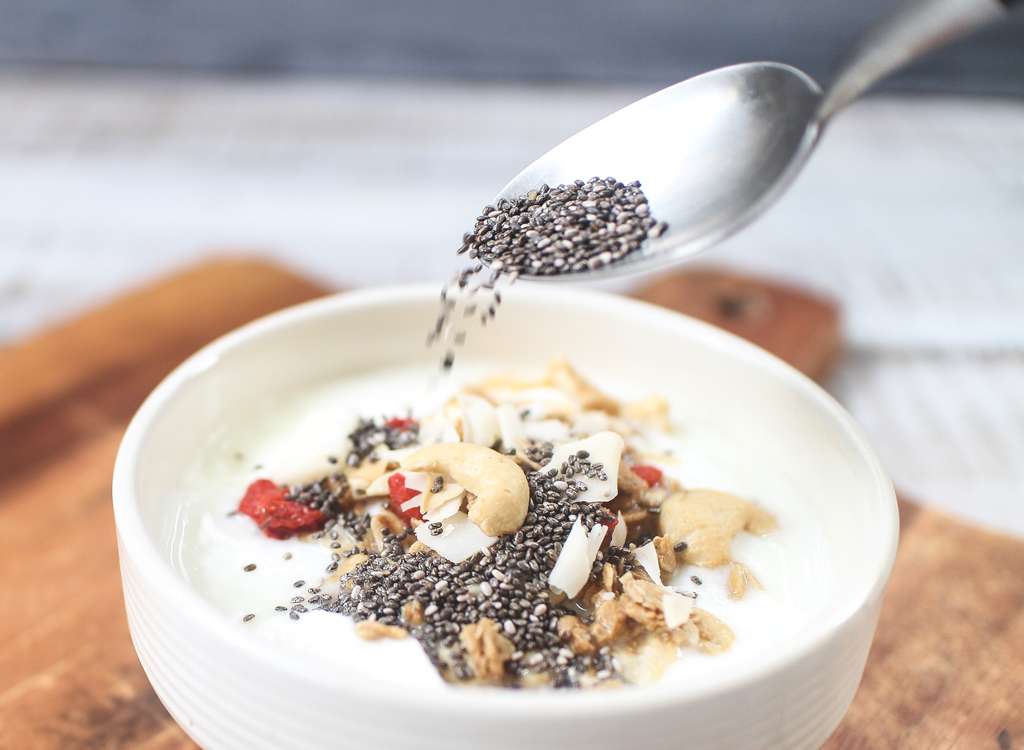
You probably already know that certain breakfast foods can make you feel more satiated and energized, as well as promote your overall health. But taking that one step further, eating the right things in the morning can actually help you live a longer life by preventing certain diseases and strengthening your immune system.
This may go without saying, but whole, plant-based foods are generally your healthiest options at breakfast time (and beyond). According to The American Heart Association, eating more vegetables, nuts, and whole grains (while also limiting salt and trans fats) can prevent deaths caused by heart and blood vessel diseases.
"When thinking about food for longevity, there are a few key areas to consider," says Sean Allt, Nutrition Coach with Innovative Fitness. "Those are decreasing inflammation and oxidative stress, keeping blood glucose relatively constant throughout the day, balancing fatty acids, and providing adequate protein."
With all of that in mind, here are some breakfast foods for a longer life. And for more healthy eating tips, be sure to check out our list of The 100 Healthiest Foods on the Planet.
Oats
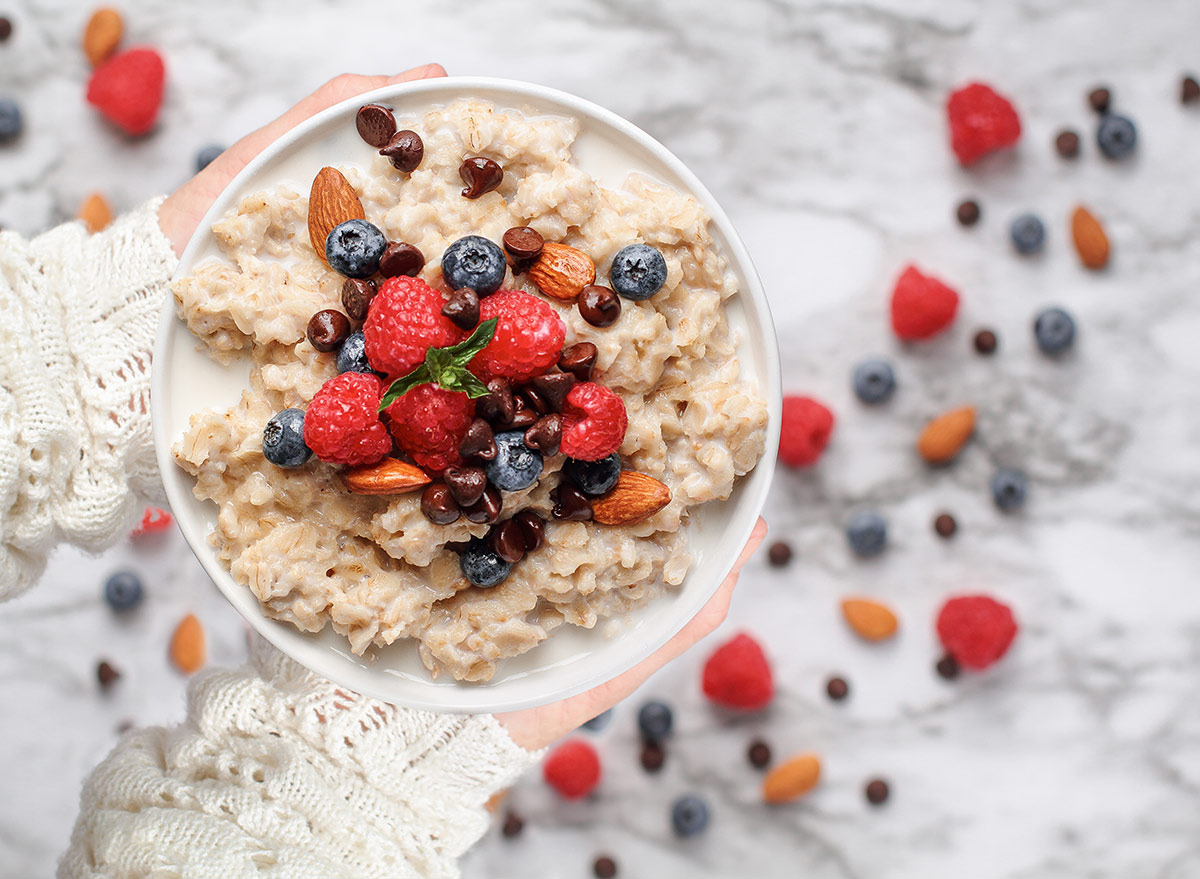
"To help manage blood glucose and insulin, you want to include some slow-digesting, high-fiber carbs at most of our meals," says Allt. "Oats are a great option for many people."
A 2011 study conducted by the National Institutes of Health found that people who ate a fiber-rich diet, specifically including whole grains, had a significantly lower risk of dying.
Additionally, another recent study published in Nutrition Journal found that people who ate 100 grams of oats a day showed a decrease in LDL "bad" cholesterol and waist circumference in comparison to those who ate 100 grams of wheat flour noodles daily. The oats-eating group saw an overall decreased risk of cardiovascular disease and hypercholesterolemia, thanks to their higher intake of fiber and lower cholesterol effect.
Clearly, a hearty bowl of oatmeal is one of the healthiest possible ways to start your morning. Make it your own with these 11 Healthy Oatmeal Toppings That Help You Lose Weight.
Chia seeds

If you want a longevity-promoting topper for your morning bowl of oats or yogurt, look no further than chia seeds—which provide an impressive 11 grams of fiber per 28-gram serving.
A small 2010 study revealed that people with diabetes who regularly ate chia seeds experienced improvements in both their blood sugar and blood pressure levels. Not only that, but chia seeds are chock-full of antioxidants, which can protect your cells against damage from free radicals. That's noteworthy, given that such damage has been associated with the development of cancer.
Incorporate chia seeds into your breakfast with one of these 15 Awesome Ideas for How to Eat Chia Seeds.
Onions
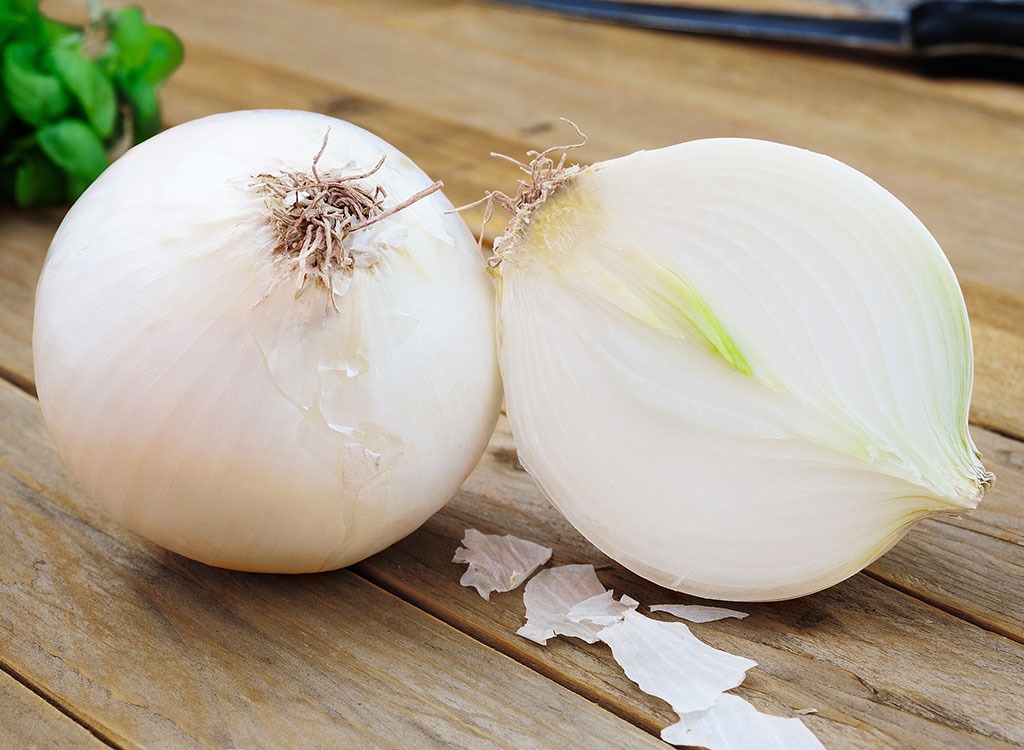
This vegetable doesn't just add a ton of flavor to eggs—it can also provide a wide variety of important nutrients, according to Allt.
Onions come from the Allium family of vegetables, which contain certain organosulfur compounds that are known to help to prevent the development of cancers. These compounds—which are released when the veggies are chopped, crushed, or chewed—can accomplish this by detoxifying carcinogens as well as halting cancer cell growth. Onions—and other veggies in this family, like garlic, shallots, and leeks—also have a high concentration of flavonoid antioxidants, which are known for their anti-inflammatory effects.
Just make sure to store them properly! Here's How You Should Be Storing Leftover Onions.
Broccoli
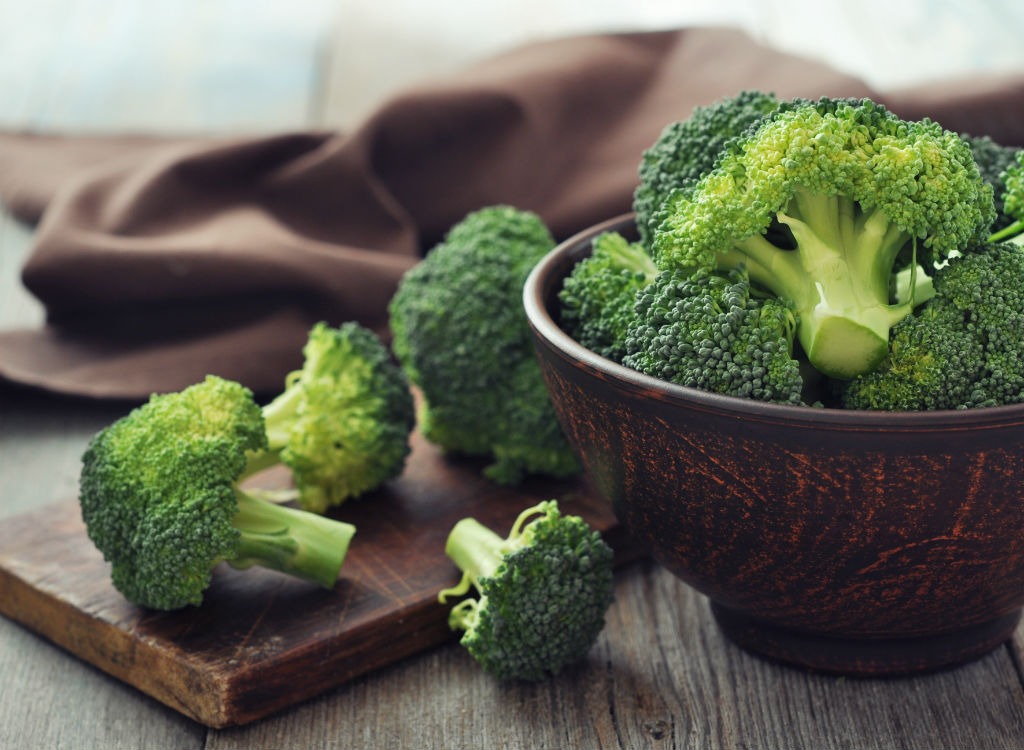
You may not think of this vegetable as a traditional breakfast food, but it's time to reconsider. Allt says this cruciferous veggie, along with Brussels sprouts, cauliflower, and kale, is a nutrient powerhouse—making it an excellent addition to your morning meal.
What's so amazing about this particular family of vegetables is that they can actually activate the body's own innate detoxification system to hinder the growth of cancerous cells.
In addition to these potent anti-cancer properties, broccoli also contains the phytochemical sulforaphane, which has been shown to shield blood vessel walls from the kind of inflammatory signaling that promotes heart disease.
Broccoli and cheddar omelet, anyone?
Leafy greens

Speaking of vegetables, Allt also highly recommends increasing your intake of leafy greens at breakfast time—such as by adding some spinach to an egg scramble or kale to a smoothie.
A greater intake of these greens has been linked to a reduced risk of heart attack, stroke, and several types of cancer.
Spinach, in particular, is packed with carotenoids—compounds that research has demonstrated may help to prevent cancer from developing and spreading. Eating these leafy greens can keep your brain sharp, too. A 2018 study found that older adults who ate one serving of spinach each day experienced less cognitive decline than those who didn't.
If you don't have fresh greens on hand for a smoothie, Allt says you can use powdered greens in a pinch for comparable benefits.
Berries
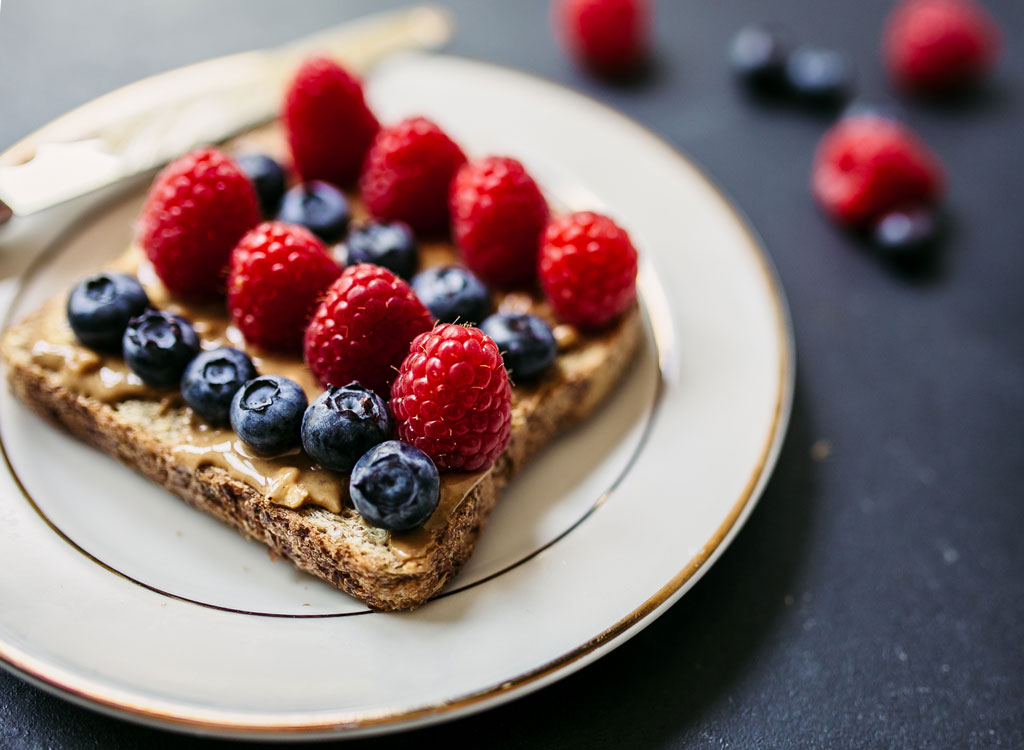
This particular type of fruit is another one of Allt's top breakfast foods for a longer life. And that's no surprise, given that a 2013 Spanish study found that people who ate berries several times a week had a 30% lower risk of dying. Researchers believe this longevity boost may stem from the berries' high concentration of polyphenols, which have been associated with a reduced risk of many chronic diseases.
One study by the Journal of Agricultural and Food Chemistry determined that blueberries, in particular, are one of the best fruit sources of antioxidants. Studies have shown that the antioxidants in this particular berry can even help to lower your LDL cholesterol levels. Here's What Happens to Your Body When You Eat a Cup of Blueberries Every Day.
Beans
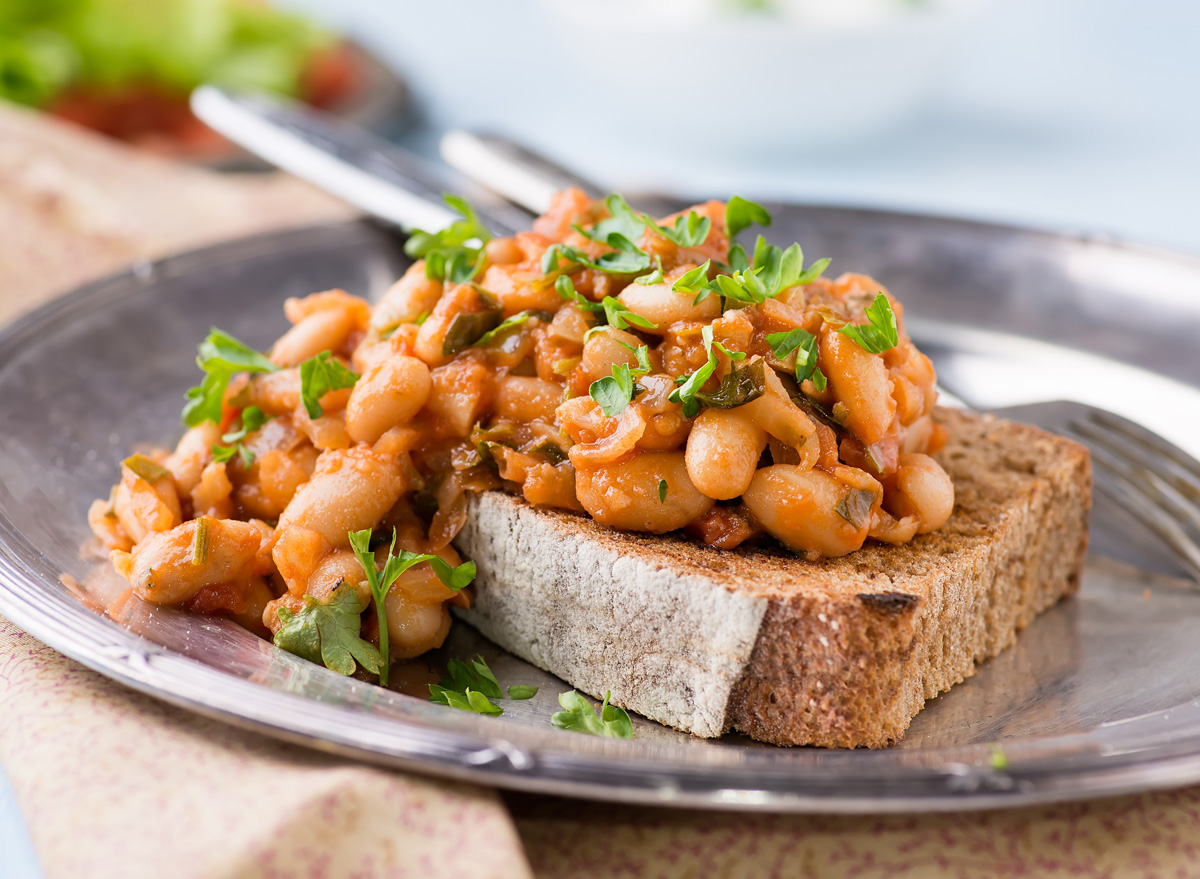
The Brits might be onto something when it comes to eating beans for breakfast. A 2004 study of elderly individuals found that for every two tablespoons of beans a day someone consumed, they reduced their risk of dying by 8%. Specifically, eating beans—as well as legumes like lentils—twice a week has been down to decrease the risk of colon cancer.
It makes sense since beans provide a hefty dose of protein, fiber-rich complex carbohydrates, and essential trace minerals—thereby boosting your immune system.
There are so many creative ways to incorporate beans and legumes into your breakfast, too—try a fluffy chickpea scramble, or a whole-wheat breakfast wrap with black beans, eggs, and avocado.
Nuts
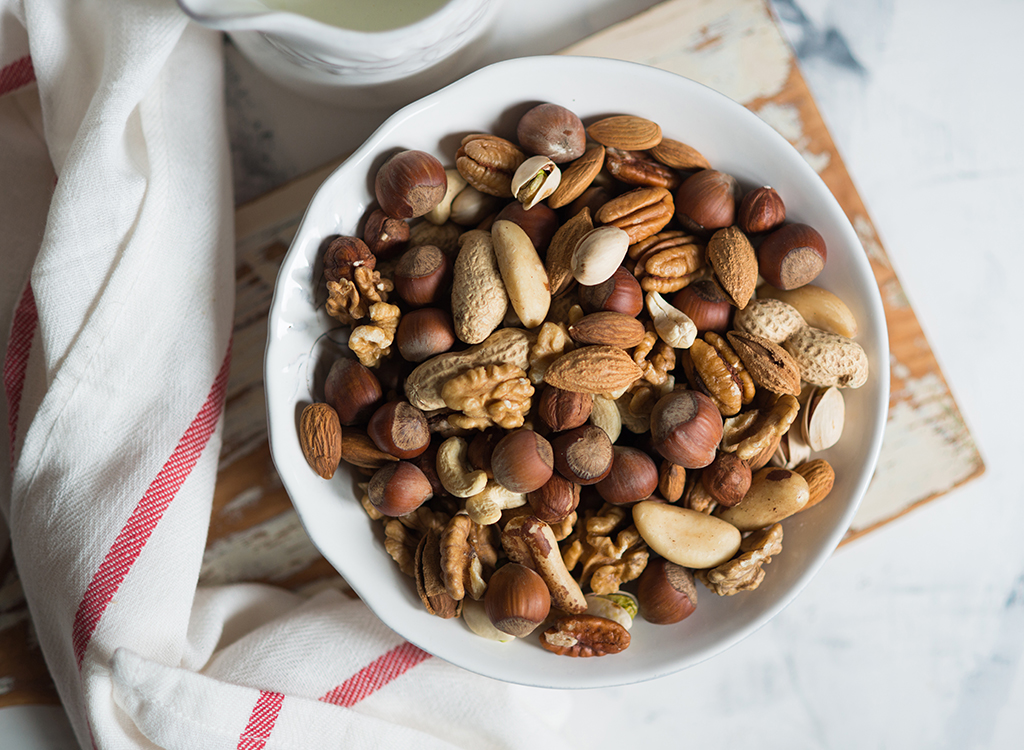
A sprinkle of walnuts or sliced almonds can add some satisfying texture to a bowl of oats or a yogurt parfait—but it can also add years to your life, according to a 2013 study done by the Harvard Medical School.
The study found that people who ate a daily 1-ounce serving of nuts were 20% less likely to die from any cause. Researcher Charles Fuchs, who helped to lead the study, speculated that this may be due to the fact that they're satiating and can help to stabilize your blood sugar—thereby potentially reducing your risk of diabetes and cardiovascular disease.
Salmon

Who doesn't love a bagel and lox? If you're a fan of this oily fish, here's some good news: the omega-3 fatty acids in salmon may help to lower your risk of heart disease, according to the American Heart Association. Additionally, a 2013 Harvard study revealed that people who ate the most fish had a 27% lower risk of dying, likely due to the fact that they were found to have the highest levels of omega-3 fatty acids in their blood.
Not sure how to incorporate this fish into your morning meal? Try stopping a slice of sprouted whole-grain toast with smoked salmon and avocado, or adding salmon to a power bowl with hard-boiled eggs, quinoa, and greens.
Grapefruit

As you probably know, grapefruit (along with other citrus fruits) is an excellent source of vitamin C—consumption of which has been shown to reduce death rates (especially due to heart disease). It's also packed with potassium, a mineral that plays a key role in heart health.
In one 2012 study, people who ate grapefruit daily for six weeks experienced significant reductions in their blood pressure—which is a primary risk factor for heart disease. Not only that, but they also demonstrated improvements in their LDL cholesterol levels (as well as their total cholesterol).
Yogurt

Whether you add yogurt to your morning smoothie or enjoy it in a bowl with fruit and nuts, you'll be glad to know that there's a ton of research that supports enjoying this food on a regular basis.
A 2019 study that tracked over 180,000 people over the course of 20 to 30 years revealed that regular yogurt eaters had a 16% lower risk of high blood pressure compared to those who ate it less than once a month. This may have something to do with the fact that yogurt is high in certain nutrients that have been known to lower your blood pressure, such as calcium.
Seeing as a 2012 study out of Japan found that eating probiotic-rich foods can increase your lifespan, it's definitely worth specifically seeking out yogurts that contain live and active cultures—and you can look for an indication of this on the nutrition label. Here are 6 Side Effects of Eating Yogurt Every Day.
Flax seeds

Did you know that your body can't naturally produce alpha-linolenic acid (ALA) fatty acids? That's why it's super important to get these fatty acids from the foods you eat—and flax seeds are a phenomenal source of them. They're also one of the richest sources of lignans, a type of polyphenol that may reduce your risk of cancer—particularly hormone-sensitive types like breast cancer and prostate cancer.
Consider adding a tablespoon or two of these seeds to your cereal, yogurt, or oats. Since whole flax seeds aren't easily digested, you may miss out on some of their important nutrients—so it's best to grind them at home before eating them.
Cottage cheese
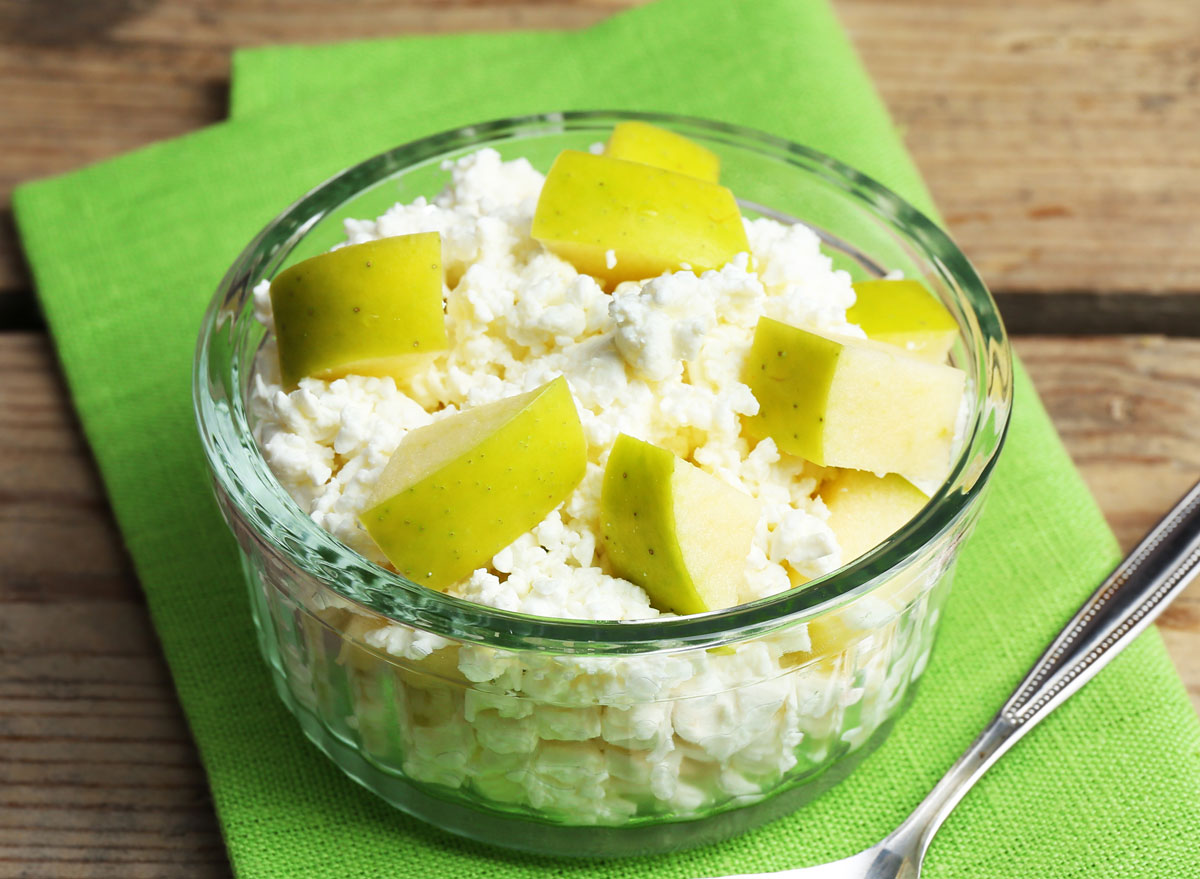
Not only is cottage cheese loaded with protein (it has more per serving than Greek yogurt), but it's also a good source of phosphorus (which is linked to improved bone health)
Studies have shown that eating this dairy product can reduce insulin resistance as well, thereby warding off the development of type 2 diabetes and heart disease.
Cottage cheese is surprisingly one of the most versatile breakfast foods for a longer life. You can enjoy it on the savory side spread onto whole-grain toast with tomato, or on the sweeter side with chopped nuts, apples, and cinnamon. Or with one of these 18 Clever Ways to Eat Cottage Cheese!
Read more about living a long, healthy life:
One Major Effect Drinking Coffee Has on Your Longevity, New Study Says
Totally Surprising Tricks for Living Longer, Says Longevity Doctor
The #1 Anti-Aging Tips Doctors Use Themselves
